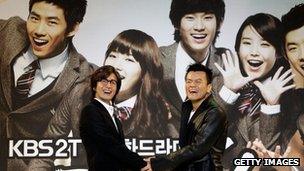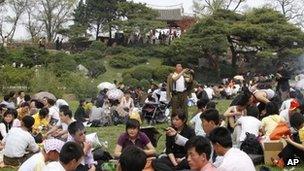North Korea access to outside media up, says US study
- Published

Viewership of foreign DVDs in North Korea, especially of South Korean dramas, have risen
North Koreans have more access than ever to outside media, including radio, TV and DVDs, a study has found.
The government was unable to maintain a ''total monopoly'' over information and the people's ''understanding of the world is changing'', said the report.
Viewing of foreign DVDs in North Korea, especially, had risen sharply.
Most of these DVDs were South Korean dramas, and had been smuggled across the border with China, said the <link> <caption>report</caption> <url href="http://www.intermedia.org/press_releases/A_Quiet_Opening_FINAL.pdf" platform="highweb"/> </link> , commissioned by the US government.
"When you get very well-produced, compelling South Korean dramas - a picture into a place that you've been fascinated with your whole life, because so much North Korean propaganda revolves around South Korea - that's extremely powerful," said Nat Kretchun, one of the authors of the study.
The study was conducted by global consulting group InterMedia over the last two years.
The findings were based on a survey of 250 North Koreans - mostly refugees and a handful of travellers, as well as expert interviews.

Most North Koreans do not have access to foreign media, but those who do appear to be rising
Almost half the respondents said they had watched a foreign DVD.
'Less fearful'
North Korea has traditionally been ranked as the country with the lowest media freedom in the world.
While the majority of North Koreans still did not have direct access to foreign media, the number of those who did ''appears to be steadily increasing'', the report said.
North Koreans are also ''less fearful of sharing that information than before'', it said.
Near the border with China and South Korea television viewing is also popular, with a third who said they watched TV claiming to have viewed foreign broadcasts.
Foreign radio broadcasts, the report added, ''remain important as a source of real-time, sensitive outside news''.
The ''elites'' - those with greater financial means or influence - have more access to external sources of media.
Recently, the report found, devices such as computers, USB drives and illegal Chinese mobile phones ''have begun entering North Korea in substantial numbers, especially among the elite''.
However, a personal network - well-connected friends and ''word-of-mouth'' - remain the most trusted source of unsanctioned information among those the study interviewed.
The increased access to external sources of information could lead North Koreans to view their own government with a more critical eye, the report concluded.
''While significant bottom-up pressure on the regime is unlikely in the short term, many people in North Korea are beginning to look more critically at the basic premises of their country's power structure and policies,'' it said.
- Published11 April 2012
- Published19 January 2012
- Published23 April 2012